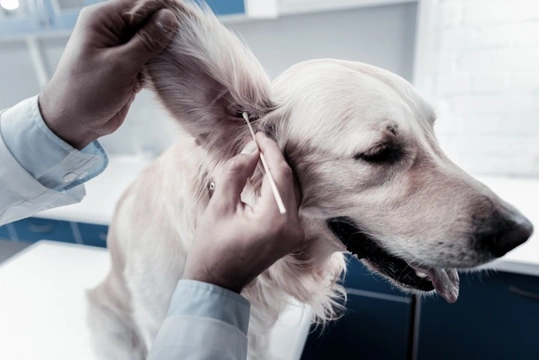
Why do my dog’s ears smell bad?
Many dog owners will tell you that putting up with weird and funny smells is something that you soon get used to when you own a dog of your own – and it is certainly true that dogs are highly adept at seeking out and homing in on all manner of objectionable things to roll in, eat, and track all over the house.
However, your dog shouldn’t ever smell bad as standard – and if your dog smells funky, nasty or unusual and it isn’t because of something they’ve rolled in or done recently, it is an indication that something is wrong.
The most common cause of bad smells around your dog’s head is dental decay and gum disease – which produces a very unpleasant and often strong smell that is hard to mistake. However, problems with your dog’s ears can also lead to some unusual and nasty smells emanating from around your dog’s head – and this isn’t something that you should ignore, because it may be your first indication of problems with your dog’s ears that will need to be resolved.
In this article, we will cover some of the most common causes of smelly ears in the dog, and how to identify them. Read on to learn more.
Ear mite infestation
Ear mite infestations are perhaps the most common cause of funky smells emanating from your dog’s ears, and these small mites can be virtually impossible to spot with the naked eye, although there are some exceptions.
The main symptom of ear mite infestation is a build-up of a greasy-looking substance that may be black and gooey or appear like wet coffee grounds, which can occlude your dog’s ear canals and cause pain and itchiness, and which will also tend to smell up close.
A dog with an ear mite infestation is also apt to scratch their ears and shake their heads a lot, as the mites can be very irritating – but your vet will be able to help you to eradicate the problem.
Bacterial infections
Bacterial infections can lead to serious ear ache, sensitivity around the ears, and irritation, as anyone who ever suffered from an ear infection themselves will already know. Infections can take root deep within your dog’s ear canal, and left unchecked, will lead to a lot of pain and compromise your dog’s hearing, as well as causing a foul smell from the ears, potentially accompanied by a discharge.
Fungal infections
Fungal and yeast infections can also affect your dog’s ears, particularly in dogs with long, floppy ears that cover the entrance to the ear canal and trap spores and contaminants in place.
Your dog’s ears might smell foul or even cheesy, and may have a white or mucky discharge, so ask your vet to check them out and prescribe a treatment.
Dirt, muck and moisture
Dogs can of course get dirt and muck inside of their ears, particularly if they like to dig the earth or stick their heads into things! This muck and debris can irritate the ear and increase the risk of an infection developing, as well as causing your dog’s ears to smell bad in and of itself.
Inner-ear injuries
If your dog injures their ear or hits their head, this can cause damage to the delicate inner ear area, even if you don’t realise it at the time. As the body works to heal itself and repair the damage, this can lead to pus, other forms of discharge, and accompanying bad smells.
Excessive earwax build-up
Dogs produce ear wax just as people do, and this ear wax is an important part of the ear’s ability to eliminate grit and dirt and keep the ears lubricated and working normally. However, some dogs produce excessive quantities of ear wax, which can not only smell bad but also obstruct your dog’s ear canal and cause pain, pressure, and hearing problems.
Hormonal health conditions
Various hormonal abnormalities, imbalances and chronic health conditions can affect many of the body’s organs and systems, and your dog’s ears are no exception. Hormonal conditions can make your dog susceptible to recurrent or hard to treat infections, increase ear wax production, and have a range of other impacts that can cause pain and discomfort for your dog, as well as foul smells from the ears and other parts of the body.
Immune-mediated conditions
On a similar note, immune-mediated health conditions also have a systemic effect on your dog’s body, and can interfere with the body’s natural functions and processes, including those of the ears.
This includes both hereditary health conditions and acquired disorders, which can generate a diverse range of symptoms that can be hard to trace back to the root cause – such as a foul ear discharge or a generally strange smell emanating from your dog’s ears.
If you ever find that your dog’s ears smell bad and you can’t work out why or assign it to a specific cause, it is important to discuss it with your vet so that they can get to the bottom of things and design a treatment protocol to help your dog to recover.



